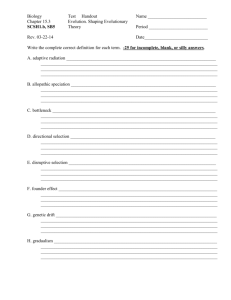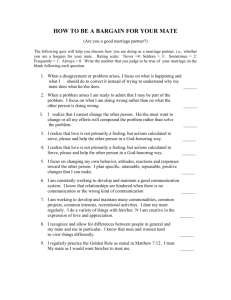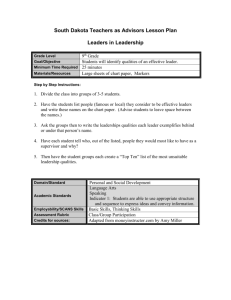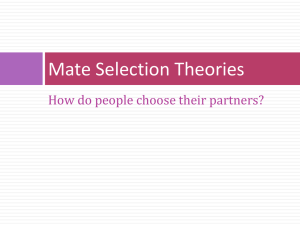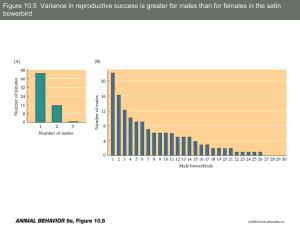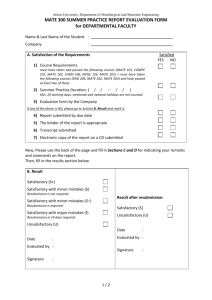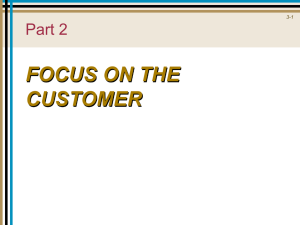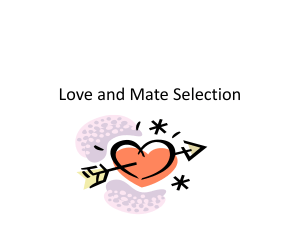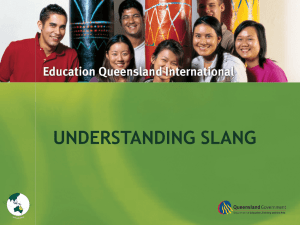The Ideal Man: An Investigation into Qualities
advertisement
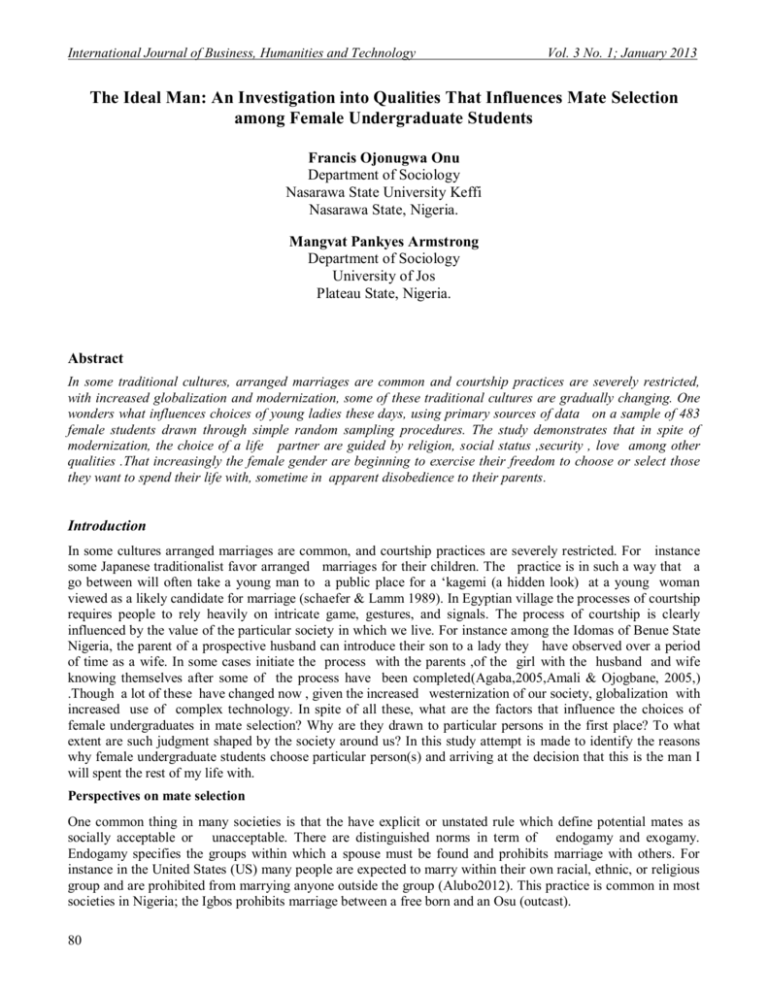
International Journal of Business, Humanities and Technology Vol. 3 No. 1; January 2013 The Ideal Man: An Investigation into Qualities That Influences Mate Selection among Female Undergraduate Students Francis Ojonugwa Onu Department of Sociology Nasarawa State University Keffi Nasarawa State, Nigeria. Mangvat Pankyes Armstrong Department of Sociology University of Jos Plateau State, Nigeria. Abstract In some traditional cultures, arranged marriages are common and courtship practices are severely restricted, with increased globalization and modernization, some of these traditional cultures are gradually changing. One wonders what influences choices of young ladies these days, using primary sources of data on a sample of 483 female students drawn through simple random sampling procedures. The study demonstrates that in spite of modernization, the choice of a life partner are guided by religion, social status ,security , love among other qualities .That increasingly the female gender are beginning to exercise their freedom to choose or select those they want to spend their life with, sometime in apparent disobedience to their parents. Introduction In some cultures arranged marriages are common, and courtship practices are severely restricted. For instance some Japanese traditionalist favor arranged marriages for their children. The practice is in such a way that a go between will often take a young man to a public place for a „kagemi (a hidden look) at a young woman viewed as a likely candidate for marriage (schaefer & Lamm 1989). In Egyptian village the processes of courtship requires people to rely heavily on intricate game, gestures, and signals. The process of courtship is clearly influenced by the value of the particular society in which we live. For instance among the Idomas of Benue State Nigeria, the parent of a prospective husband can introduce their son to a lady they have observed over a period of time as a wife. In some cases initiate the process with the parents ,of the girl with the husband and wife knowing themselves after some of the process have been completed(Agaba,2005,Amali & Ojogbane, 2005,) .Though a lot of these have changed now , given the increased westernization of our society, globalization with increased use of complex technology. In spite of all these, what are the factors that influence the choices of female undergraduates in mate selection? Why are they drawn to particular persons in the first place? To what extent are such judgment shaped by the society around us? In this study attempt is made to identify the reasons why female undergraduate students choose particular person(s) and arriving at the decision that this is the man I will spent the rest of my life with. Perspectives on mate selection One common thing in many societies is that the have explicit or unstated rule which define potential mates as socially acceptable or unacceptable. There are distinguished norms in term of endogamy and exogamy. Endogamy specifies the groups within which a spouse must be found and prohibits marriage with others. For instance in the United States (US) many people are expected to marry within their own racial, ethnic, or religious group and are prohibited from marrying anyone outside the group (Alubo2012). This practice is common in most societies in Nigeria; the Igbos prohibits marriage between a free born and an Osu (outcast). 80 © Centre for Promoting Ideas, USA www.ijbhtnet.com These have broken relationship between two potential couples who genuinely love each other and could have made wonderful couples. Also marriages are discouraged among families who are known to practice witchcraft or have cases of mental illness in some societies in Nigeria. Exogamy is the situation where male selection requirement are outside certain groups. Usually ones own family or certain kinfolk. The virtually all societies, prohibits sexual relationship between certain culturally specifies relatives. The taboo means that we must marry outside the nuclear family not our siblings, we must not marry our first cousin and so on.(Alubo2012). Race, religion and ethnicity are influential factors in mate selecting in most societies especially in Nigeria. The multi-ethnic, multi-religious and multi- linguistic nature of the Nigerian societies is critical in understanding the dynamics associated with mate selection. With the increased in intergroup hostilities in form of ethno- religious and ethno- political and most recently the boko haram crisis, mate selection are greatly influenced by these factors of religion, ethnicity and race .Even the choice of where to live is greatly influenced by these factors. Monogamy refers to the conscious or unconscious tendency to select a mate with personal characteristics similar to ones .According to this theory, although we may not totally surround ourselves with a „gallery of resemblance „ we do seek out and established relationships with individuals who are similar to us in their personality and cultural interests. Monogamy in mate selection seems to negate the popular held notion that „opposition attract‟. However, there is the tendency that potential couples seek some similarity in their mates. Finally, heterogamy refers to our conscious or unconscious tendency to choose a mate with personal characteristics different from ours. Winch(1958,1967) advanced the belief that certain persons seek out others who are their opposite in his complementary – need theory , Acknowledge that monogamy is an extremely important factors in the choice of a mate, Winch contents that people‟s final selection may reflect a mutual desire to form an association with someone who complement (rather than mirror) their own personalities. The views expressed by these female undergraduate students are in support winch‟s contention. Objectives of the study The study seeks to find out factors that influenced mate selection in an increasely globalized world with increased use of complex technology. It examines factors that influence the choices of mate selection, the reasons why particular persons are drawn to each other and to the extent that such judgments are shaped by the society around us. Methodology The study used a sample of four hundred and eighty–three (483), female undergraduates drawn from the Nasarawa State University, Keffi using the simple random sampling procedures. While in-depth interview was the instrument used to collect information from these female undergraduate students. The data were analyzed using statistical tools such as tabulation and bar chart. 81 International Journal of Business, Humanities and Technology Vol. 3 No. 1; January 2013 Analysis and Interpretation of Data The qualities of an ideal man Frequency Valid Respectable and God fearing Loving and caring Educated must be tall Handsome Hardworking Financially comfortable Smarth and intelligent Calm and reserve Must be understanding must be patience must be good in bed must be trusted dark in complexion Responsible Generous Focus love me the way I am Fair in complexion Good leader Neat and well dress Healthy eloquent Friendly come from good family spent quality time with me Creative sympathetic not be womanizer Bold Discipline Older than me Not be bias Lover of kids must keep secrete not an alcoholic/cigarette Total 82 Percent Valid Percent Cumulative Percent 81 16.8 16.8 16.8 39 38 33 8.1 7.9 6.8 8.1 7.9 6.8 24.8 32.7 39.5 31 6.4 6.4 46.0 24 19 5.0 3.9 5.0 3.9 50.9 54.9 16 15 15 3.3 3.1 3.1 3.3 3.1 3.1 58.2 61.3 64.4 13 13 13 12 12 11 2.7 2.7 2.7 2.5 2.5 2.3 2.7 2.7 2.7 2.5 2.5 2.3 67.1 69.8 72.5 74.9 77.4 79.7 10 8 7 7 7 2.1 1.7 1.4 1.4 1.4 2.1 1.7 1.4 1.4 1.4 81.8 83.4 84.9 86.3 87.8 7 7 1.4 1.4 1.4 1.4 89.2 90.7 7 1.4 7 5 5 1.4 1.0 1.0 1.4 1.4 92.1 93.6 1.0 1.0 94.6 95.7 4 4 .8 .8 .8 .8 96.5 97.3 3 .6 .6 97.9 3 2 .6 .4 .6 .4 98.6 99.0 2 1 1 .4 .2 .2 .4 .2 .2 99.4 99.6 99.8 1 483 .2 100.0 .2 100.0 100.0 © Centre for Promoting Ideas, USA Not be bias not an alcoholic/cig www.ijbhtnet.com Bold dark in complexion love me the way I am Disc ipline must keep secrete Educated Healthy Must be understandin must be trus ted must be tall Smarth and intellige must be good in bed Responsible Calm and reserve Fair in complexion Financially c omforta Focus Generous Respectable and God Good leader Handsome Hardworking must be patienc e Older than me Neat and well dress Loving and caring Lover of kids The female students were asked to outline the qualities expected in their ideal man and the following thirty-six qualities were identified. In spite of globalization of our culture, most female undergraduates prefer as a first quality in their ideal man “he must be respectable and God fearing”. This suggests that Nigerians are still very religious and feels that what makes for an ideal man is his fear of God. The fear of God is suggestive of a loving and caring man who will not cheat against his wife for fear of God. The second quality desired by these female undergraduates is „'he must be educated” Of course one is not surprised because a natural consequence of being a university student pre-supposes that the person who will share your life with you should also have some form of education. Education is one critical element impinging on the development process and a critical tool for redistributing resources in the society. (Fadahunsi 1993, Onu, 2008). The fourth quality desired by these female students for a man who will win their heart is that “He must be tall”. Height is critical a criterion required for marriage. This is because they are easily socially accepted and can easily command the respect of people. Tall men are highly spoken of before their actual qualities are assessed. The fifth quality expected of the ideal man by these female undergraduates is that “He must be a handsome man”. Beauty they say is in the eye of the beholder. I should think that handsomeness too should be in the eye of the beholder. Whatever that represent, the import of it is that the man should be presentable without physical deformity. The sixth quality expected of the ideal man is that “He must be a hardworking man” indirectly, the list of qualities desired in a life partner by female undergraduates. How does being handsome become more important than being a hard worker? One should naturally expect that, working hard should be of more importance than being handsome but that is not the case here. Whatever the expectation its, the choice has been made and it reveals the inner desire of most young ladies. This suggests that young ladies are first moved by externalities and settles down to realities later in life. 83 International Journal of Business, Humanities and Technology Vol. 3 No. 1; January 2013 The seventh quality is that “He must be financially comfortable” this quality can be subject to several interpretations since being financially comfortable is relative. One can be said to be financially comfortable if he can meet the needs of his family. Another person can be said to be financially comfortable if he provide the luxury of life. Whatever the interpretation of financial comfort ability its, the deducible meaning is that most female undergraduates do not want to marry and suffer lack and want after marriage. The list of the qualities graduates up to thirty-six (36). But the frequency diminished as it graduates down the ladder. As we ran through these qualities listed by female undergraduates it brings to mind that, gradually the female gender is beginning to assert. Their independence and do have their choices and preferences. This defines a generation that are beginning to define what they want and going for it. The role which globalization, that is, internet and other social media such as face book are playing in defining these choices and preferences can only be captured in a separate study. Conclusion This study attempted to identify the qualities that draw female undergraduates to particular persons as their life partner. To achieve this; perspective on mate selection was do assessed which are Endogamy, Exogamy, Homogony and Heterogamy theories of Mate selection: The study analyzed the qualities identified by these female undergraduates and found that the man that will win their love must first be respectable and God fearing, second, must be loving and caring, third, must be educated, fourth, must be tall and these qualities graduates and diminishes in pregnancy up to thirty-six (36). The study concludes that the emerging generations of female undergraduates are ones that have their choices, preferences and desires and that globalization i.e. internet and other social media are playing a part in this whole phenomenon which needs further investigation. Recommendations It is recommended that parents most actively be involved in the lives of their children, to guide and lead them properly recognizing their choices, preferences and desires and helping them to arrive at decision that will not lead to regrets and pains later in life (Adesina & Rufus,2005, Odey,2005). It is also recommended that scholars in the sociology should actively engage studies on the effects of globalization i.e. internet, social media such as face book to mention these two, to help shape policy making thereby reducing the negative effects on mate selection. Finally, the new methods of doing things can only be better if contextualized within our cherished traditional and cultural values, to help preserve a generation who are not completely out of tune with our cherished traditional and cultural ways of doing things. References Adesina, A.L and Rufus, T.F (2005). “The Indices of Change in the Family Institution among Women in Ekiti State of Nigeria” in Journal of Family Development, Volume 1(2) Agaba, J.E (2005) “The Changing Socio-economic Role of Idoma Women During Colonialism in Journal of Family Development. Volume 1(2) Alubo, O (2012) Sociology: A concise introduction Jos: Ichejum press. Amali, A.O and Ojogbene, V.J (2005) “The Child, Family and Value Inculcation in Idoma Land “in Journal of Family Development. Volume 1(2) Fadahunsi, A (1993) “Devaluation: Implication for Employment, Inflation, Growth and Development. “In A.O Olukoshi (ed) The Politics of Structural Adjustment in Nigeria Ibadan: Heinemann Educational Books Nigeria PLC. Hogan, M.O (2006). Dictionary of sociology India: Academic (India) Publishers Kewbe, E.M and Kembe, M.M (2004). “Adolescent Sexual Behavior and its Implications for the Nigerian Family” in the Journal of Family Development. Volume 1 (2) November. Odey, J.E (2005) “The Role of the Family in Sex and Sexuality Education “In Journal of Family Development. Volume 1(2) Onu, F.O. (2008). “Educating Nigerians for Sustainable Development: Issues and Perspectives “in EDNA : African Journal of Modern Society. Volume 1(1) Schaefer R.T and Lamm, R.P(1989). Sociology. New York; Mc Graw-Hill, Inc. Winch, R.F (1958). Mate selection. New York: Harper. Winch, R.F (1967). “Another look at the theory of complementary needs in Mate Selection “in Journal of marriage and the family. 29 November. 84
